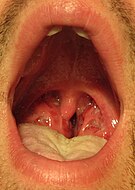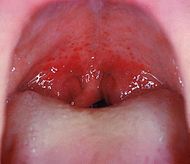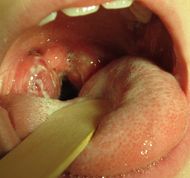Streptococcal pharyngitis: Difference between revisions
removed Category:Microbiology using HotCat |
m Various citation & identifier cleanup, plus AWB genfixes. Report errors and suggestions at User talk:CitationCleanerBot. |
||
| Line 87: | Line 87: | ||
===Analgesics=== |
===Analgesics=== |
||
Analgesics such as [[non-steroidal anti-inflammatory drug]]s (NSAIDs) and [[paracetamol]] (acetaminophen) help significantly in the management of pain associated with strep throat.<ref name=Review00>{{cite journal |author=Thomas M, Del Mar C, Glasziou P |title=How effective are treatments other than antibiotics for acute sore throat? |journal=Br J Gen Pract |volume=50 |issue=459 |pages=817–20 |year=2000 |month=October |pmid=11127175 |pmc=1313826 |doi=}}</ref> [[Steroids]] are also useful in this respect<ref name=Review10/><ref>{{Cite web|url=http://www3.interscience.wiley.com/journal/123372200/abstract |title=Effectiveness of Corticosteroid Treatment in Acute Pharyngitis: A Systematic Review of the Literature. |
Analgesics such as [[non-steroidal anti-inflammatory drug]]s (NSAIDs) and [[paracetamol]] (acetaminophen) help significantly in the management of pain associated with strep throat.<ref name=Review00>{{cite journal |author=Thomas M, Del Mar C, Glasziou P |title=How effective are treatments other than antibiotics for acute sore throat? |journal=Br J Gen Pract |volume=50 |issue=459 |pages=817–20 |year=2000 |month=October |pmid=11127175 |pmc=1313826 |doi=}}</ref> [[Steroids]] are also useful in this respect<ref name=Review10/><ref>{{Cite web|url=http://www3.interscience.wiley.com/journal/123372200/abstract |title=Effectiveness of Corticosteroid Treatment in Acute Pharyngitis: A Systematic Review of the Literature.|work=Andrew Wing. 2010; Academic Emergency Medicine |accessdate=}}</ref> as is viscous [[lidocaine]].<ref>{{Cite web|url=http://www.medicinenet.com/lidocaine_viscous/article.htm |title=Generic Name: Lidocaine Viscous (Xylocaine Viscous) side effects, medical uses, and drug interactions |work=MedicineNet.com |accessdate=2010-05-07}}</ref> Aspirin may be used in adults but is not recommended in children due to the risk of [[Reye's syndrome]].<ref name=Review10/> |
||
===Antibiotics=== |
===Antibiotics=== |
||
| Line 93: | Line 93: | ||
==Prognosis== |
==Prognosis== |
||
The symptoms of strep throat usually improve irrespective of treatment within three to five days.<ref name=IDSAGuideline2002>{{cite journal |author=Bisno AL, Gerber MA, Gwaltney JM, Kaplan EL, Schwartz RH |title=Practice guidelines for the diagnosis and management of group A streptococcal pharyngitis. [[Infectious Diseases Society of America]] |journal=Clin. Infect. Dis. |volume=35 |issue=2 |pages=113–25 |year=2002 |month=July |pmid=12087516 |doi= |
The symptoms of strep throat usually improve irrespective of treatment within three to five days.<ref name=IDSAGuideline2002>{{cite journal |author=Bisno AL, Gerber MA, Gwaltney JM, Kaplan EL, Schwartz RH |title=Practice guidelines for the diagnosis and management of group A streptococcal pharyngitis. [[Infectious Diseases Society of America]] |journal=Clin. Infect. Dis. |volume=35 |issue=2 |pages=113–25 |year=2002 |month=July |pmid=12087516 |doi=10.1086/340949}}</ref> Treatment with antibiotics reduces the risk of complications and transmission; children may return to school 24 hours after antibiotics are administered.<ref name=Review09/> |
||
Complications arising from streptococcal throat infections include: |
Complications arising from streptococcal throat infections include: |
||
* [[Rheumatic fever|Acute rheumatic fever]]<ref name=Review06/> |
* [[Rheumatic fever|Acute rheumatic fever]]<ref name=Review06/> |
||
* [[Scarlet fever]]<ref name=Uptodate/> |
* [[Scarlet fever]]<ref name=Uptodate/> |
||
* [[Toxic shock syndrome|Streptococcal toxic shock syndrome]]<ref name=Uptodate>{{Cite web|url=http://www.utdol.com/online/content/topic.do?topicKey=upp_resp/4610 |title=UpToDate Inc. |
* [[Toxic shock syndrome|Streptococcal toxic shock syndrome]]<ref name=Uptodate>{{Cite web|url=http://www.utdol.com/online/content/topic.do?topicKey=upp_resp/4610 |title=UpToDate Inc. |work= |accessdate=}}</ref><ref>{{cite journal |author=Stevens DL, Tanner MH, Winship J, ''et al.'' |title=Severe group A streptococcal infections associated with a toxic shock-like syndrome and scarlet fever toxin A |journal=N. Engl. J. Med. |volume=321 |issue=1 |pages=1–7 |year=1989 |month=July |pmid=2659990 |doi= 10.1056/NEJM198907063210101|url=}}</ref> |
||
* [[Glomerulonephritis]]<ref name=Review05/> |
* [[Glomerulonephritis]]<ref name=Review05/> |
||
* [[PANDAS|PANDAS syndrome]]<ref name=Review05>{{cite journal |author=Hahn RG, Knox LM, Forman TA |title=Evaluation of poststreptococcal illness |journal=Am Fam Physician |volume=71 |issue=10 |pages=1949–54 |year=2005 |month=May |pmid=15926411 |doi= |url=}}</ref> |
* [[PANDAS|PANDAS syndrome]]<ref name=Review05>{{cite journal |author=Hahn RG, Knox LM, Forman TA |title=Evaluation of poststreptococcal illness |journal=Am Fam Physician |volume=71 |issue=10 |pages=1949–54 |year=2005 |month=May |pmid=15926411 |doi= |url=}}</ref> |
||
Revision as of 03:49, 12 September 2011
| Streptococcal pharyngitis | |
|---|---|
| Specialty | Otorhinolaryngology, infectious diseases |
Streptococcal pharyngitis, streptococcal tonsillitis, or streptococcal sore throat (known colloquially as strep throat) is a type of pharyngitis caused by a group A streptococcal infection.[1] It affects the pharynx including the tonsils and possibly the larynx. Common symptoms include fever, sore throat, and enlarged lymph nodes. It is the cause of 37% of sore throats among children.[2]
Strep throat is a contagious infection, spread through close contact with an infected individual. A definitive diagnosis is made based on the results of a throat culture. However, this is not always needed as treatment may be decided based on symptoms. In highly likely or confirmed cases, antibiotics are useful to both prevent complications and speed recovery.[3]
Signs and symptoms
The typical symptoms of streptococcal pharyngitis are a sore throat, fever of greater than 38 °C (100 °F), tonsillar exudates (pus on the tonsils), and large cervical lymph nodes.[3]
Other symptoms include:
- Headache[4]
- Nausea and vomiting[4]
- Abdominal pain[4]
- Myalgia (muscle pain)[5]
- Scarlatiniform rash or palatal petechiae[3]
The incubation period and thus the start of symptoms for strep throat is between one to three days post contact.[3]
-
A throat infection which on culture tested positive for group A streptococcus. Note the large tonsils with white exudate.
-
Note the petechiae, or small red spots, on the soft palate. This is an uncommon but highly specific finding in streptococcal pharyngitis.[3]
-
A culture positive case of streptococcal pharyngitis with typical tonsillar exudate in an 8 year old.
Cause
Strep throat is caused by group A beta-hemolytic streptococcus (GAS).[6] Other bacteria such as non–group A beta-hemolytic streptococci and fusobacterium may also cause pharyngitis.[3][5] It is spread by direct, close contact with an infected person and thus crowding as may be found in the military and schools increases the rate of transmission.[5][7] It has been found that dried bacteria in dust are not infectious, although moist bacteria on toothbrushes or similar items can persist for up to fifteen days.[5] Rarely, contaminated food can result in outbreaks.[5] Of children with no signs or symptoms 12% carry GAS in their pharynx.[2]
Diagnosis
| Points | Probability of Strep | Management |
|---|---|---|
| 1 or less | <10% | No antibiotic or culture needed |
| 2 | 11–17% | Antibiotic based on culture or RADT |
| 3 | 28–35% | |
| 4 or 5 | 52% | Empiric antibiotics |
The modified Centor score is used to determine the management of people with pharyngitis. Based on 5 clinical criteria, it indicates the probability of a streptococcal infection.[3]
One point is given for each of the criteria:[3]
- Absence of a cough
- Swollen and tender cervical lymph nodes
- Temperature >38 °C (100 °F)
- Tonsillar exudate or swelling
- Age less than 15 (a point is subtracted if age >44)
Laboratory testing
A throat culture is the gold standard[8] for the diagnosis of streptococcal pharyngitis with a sensitivity of 90–95%.[3] A rapid strep test (also called rapid antigen detection testing or RADT) may also be used. While the rapid strep test is quicker, it has a lower sensitivity (70%) and statistically equal specificity (98%) as throat culture.[3]
A positive throat culture or RADT in association with symptoms establishes a positive diagnosis in those in which the diagnosis is in doubt.[9] Asymptomatic individuals should not be routinely tested with a throat culture or RADT because a certain percentage of the population persistently "carries" the streptococcal bacteria in their throat without any harmful results.[9]
Differential diagnosis
As the symptoms of streptococcal pharyngitis overlap with other conditions it can be difficult to make the diagnosis clinically.[3] Coughing, nasal discharge, diarrhea, and red, irritated eyes in addition to fever and sore throat are more indicative of a viral sore throat than of strep throat.[3] The presence of marked lymph node enlargement along with sore throat, fever and tonsillar enlargement may also occur in infectious mononucleosis.[10]
Prevention
Tonsillectomy may be a reasonable preventative measure in those with frequent throat infections.[11][12] Three or more a year was seen as sufficient in 2003.[13] Watchful waiting is also appropriate.[11]
Treatment
Untreated streptococcal pharyngitis usually resolves within a few days.[3] Treatment with antibiotics shortens the duration of the acute illness by about 16 hours.[3] The primary reason for treatment with antibiotics is to reduce the risk of complications such as rheumatic fever and retropharyngeal abscesses[3] and they are effective if given within 9 days of the onset of symptoms.[6]
Analgesics
Analgesics such as non-steroidal anti-inflammatory drugs (NSAIDs) and paracetamol (acetaminophen) help significantly in the management of pain associated with strep throat.[14] Steroids are also useful in this respect[6][15] as is viscous lidocaine.[16] Aspirin may be used in adults but is not recommended in children due to the risk of Reye's syndrome.[6]
Antibiotics
The antibiotic of choice in the United States for streptococcal pharyngitis is penicillin V due to safety, cost, and effectiveness.[3] Amoxicillin is preferred in Europe.[17] In India, where the risk of rheumatic fever is higher, intramuscular benzathine penicillin G is the first choice for treatment.[6] Appropriate antibiotics decrease the average 3–5 day duration of symptoms by about one day, and also reduce contagiousness.[9] They are primarily prescribed out of a motivation to reduce rare complications such as acute rheumatic fever and peritonsillar abscess.[18] The arguments in favour of antibiotic treatment should be balanced by the consideration of possible side effects,[5] and it is reasonable to suggest that no antimicrobial treatment be given to healthy adults who have adverse reactions to medication.[18] Antibiotics are prescribed for strep throat at a higher rate than would be expected from its prevalence.[19] Erythromycin and other macrolides are recommended for people with severe penicillin allergies.[3] First, general cephalosporins may be used in those with less severe allergies.[3] Streptococcal infections may also lead to acute glomerulonephritis, however the incidence of this side effect is not reduced by the use of antibiotics.[6]
Prognosis
The symptoms of strep throat usually improve irrespective of treatment within three to five days.[9] Treatment with antibiotics reduces the risk of complications and transmission; children may return to school 24 hours after antibiotics are administered.[3]
Complications arising from streptococcal throat infections include:
- Acute rheumatic fever[4]
- Scarlet fever[20]
- Streptococcal toxic shock syndrome[20][21]
- Glomerulonephritis[22]
- PANDAS syndrome[22]
Epidemiology
Pharyngitis, the broader category into which Streptococcal pharyngitis falls, is diagnosed in 11 million people annually in the United States.[3] Although most cases are viral, group A beta-hemolytic streptococcus is the cause in 15–30% of the pharyngitis cases in children and 5–20% in adults.[3] Cases usually occur in late winter and early spring.[3]
References
- ^ "streptococcal pharyngitis" at Dorland's Medical Dictionary
- ^ a b Shaikh N, Leonard E, Martin JM (2010). "Prevalence of streptococcal pharyngitis and streptococcal carriage in children: a meta-analysis". Pediatrics. 126 (3): e557–64. doi:10.1542/peds.2009-2648. PMID 20696723.
{{cite journal}}: Unknown parameter|month=ignored (help)CS1 maint: multiple names: authors list (link) - ^ a b c d e f g h i j k l m n o p q r s t u v Choby BA (2009). "Diagnosis and treatment of streptococcal pharyngitis". Am Fam Physician. 79 (5): 383–90. PMID 19275067.
{{cite journal}}: Unknown parameter|month=ignored (help) - ^ a b c d Brook I, Dohar JE (2006). "Management of group A beta-hemolytic streptococcal pharyngotonsillitis in children". J Fam Pract. 55 (12): S1–11, quiz S12. PMID 17137534.
{{cite journal}}: Unknown parameter|month=ignored (help) - ^ a b c d e f Hayes CS, Williamson H (2001). "Management of Group A beta-hemolytic streptococcal pharyngitis". Am Fam Physician. 63 (8): 1557–64. PMID 11327431.
{{cite journal}}: Unknown parameter|month=ignored (help) - ^ a b c d e f Baltimore RS (2010). "Re-evaluation of antibiotic treatment of streptococcal pharyngitis". Curr. Opin. Pediatr. 22 (1): 77–82. doi:10.1097/MOP.0b013e32833502e7. PMID 19996970.
{{cite journal}}: Unknown parameter|month=ignored (help) - ^ Lindbaek M, Høiby EA, Lermark G, Steinsholt IM, Hjortdahl P (2004). "Predictors for spread of clinical group A streptococcal tonsillitis within the household". Scand J Prim Health Care. 22 (4): 239–43. doi:10.1080/02813430410006729. PMID 15765640.
{{cite journal}}: CS1 maint: multiple names: authors list (link) - ^ Smith, Ellen Reid; Kahan, Scott; Miller, Redonda G. (2008). In A Page Signs & Symptoms. In a Page Series. Hagerstown, Maryland: Lippincott Williams & Wilkins. p. 312. ISBN 0-7817-7043-2.
- ^ a b c d Bisno AL, Gerber MA, Gwaltney JM, Kaplan EL, Schwartz RH (2002). "Practice guidelines for the diagnosis and management of group A streptococcal pharyngitis. Infectious Diseases Society of America". Clin. Infect. Dis. 35 (2): 113–25. doi:10.1086/340949. PMID 12087516.
{{cite journal}}: Unknown parameter|month=ignored (help)CS1 maint: multiple names: authors list (link) - ^ Ebell MH (2004). "Epstein-Barr virus infectious mononucleosis". Am Fam Physician. 70 (7): 1279–87. PMID 15508538.
- ^ a b Paradise JL, Bluestone CD, Bachman RZ; et al. (1984). "Efficacy of tonsillectomy for recurrent throat infection in severely affected children. Results of parallel randomized and nonrandomized clinical trials". N. Engl. J. Med. 310 (11): 674–83. doi:10.1056/NEJM198403153101102. PMID 6700642.
{{cite journal}}: Explicit use of et al. in:|author=(help); Unknown parameter|month=ignored (help)CS1 maint: multiple names: authors list (link) - ^ Alho OP, Koivunen P, Penna T, Teppo H, Koskela M, Luotonen J (2007). "Tonsillectomy versus watchful waiting in recurrent streptococcal pharyngitis in adults: randomised controlled trial". BMJ. 334 (7600): 939. doi:10.1136/bmj.39140.632604.55. PMC 1865439. PMID 17347187.
{{cite journal}}: Unknown parameter|month=ignored (help)CS1 maint: multiple names: authors list (link) - ^ Johnson BC, Alvi A (2003). "Cost-effective workup for tonsillitis. Testing, treatment, and potential complications". Postgrad Med. 113 (3): 115–8, 121. PMID 12647478.
{{cite journal}}: Unknown parameter|month=ignored (help) - ^ Thomas M, Del Mar C, Glasziou P (2000). "How effective are treatments other than antibiotics for acute sore throat?". Br J Gen Pract. 50 (459): 817–20. PMC 1313826. PMID 11127175.
{{cite journal}}: Unknown parameter|month=ignored (help)CS1 maint: multiple names: authors list (link) - ^ "Effectiveness of Corticosteroid Treatment in Acute Pharyngitis: A Systematic Review of the Literature". Andrew Wing. 2010; Academic Emergency Medicine.
- ^ "Generic Name: Lidocaine Viscous (Xylocaine Viscous) side effects, medical uses, and drug interactions". MedicineNet.com. Retrieved 2010-05-07.
- ^ Bonsignori F, Chiappini E, De Martino M (2010). "The infections of the upper respiratory tract in children". Int J Immunopathol Pharmacol. 23 (1 Suppl): 16–9. PMID 20152073.
{{cite journal}}: CS1 maint: multiple names: authors list (link) - ^ a b Snow V, Mottur-Pilson C, Cooper RJ, Hoffman JR (2001). "Principles of appropriate antibiotic use for acute pharyngitis in adults" (PDF). Ann Intern Med. 134 (6): 506–8. PMID 11255529.
{{cite journal}}: Unknown parameter|month=ignored (help)CS1 maint: multiple names: authors list (link) - ^ Linder JA, Bates DW, Lee GM, Finkelstein JA (2005). "Antibiotic treatment of children with sore throat". J Am Med Assoc. 294 (18): 2315–22. doi:10.1001/jama.294.18.2315. PMID 16278359.
{{cite journal}}: Unknown parameter|month=ignored (help)CS1 maint: multiple names: authors list (link) - ^ a b "UpToDate Inc".
- ^ Stevens DL, Tanner MH, Winship J; et al. (1989). "Severe group A streptococcal infections associated with a toxic shock-like syndrome and scarlet fever toxin A". N. Engl. J. Med. 321 (1): 1–7. doi:10.1056/NEJM198907063210101. PMID 2659990.
{{cite journal}}: Explicit use of et al. in:|author=(help); Unknown parameter|month=ignored (help)CS1 maint: multiple names: authors list (link) - ^ a b Hahn RG, Knox LM, Forman TA (2005). "Evaluation of poststreptococcal illness". Am Fam Physician. 71 (10): 1949–54. PMID 15926411.
{{cite journal}}: Unknown parameter|month=ignored (help)CS1 maint: multiple names: authors list (link)



